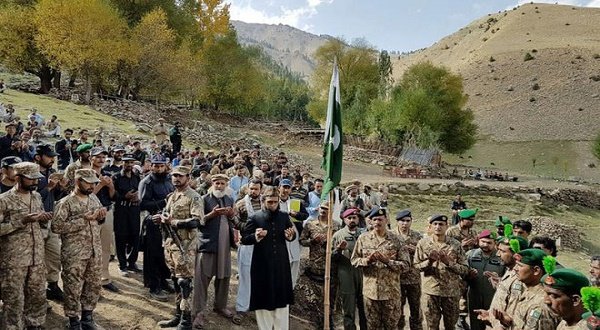
NEW DELHI (AFP) — Indian and Pakistani troops exchanged fresh fire across their border Saturday as UN chief Ban Ki-moon offered to mediate between the nuclear-armed neighbors following an alarming spike in tensions.
Two days after Indian troops carried out a series of strikes across the Pakistani side of their dividing line in disputed Kashmir, officials said there had been cross-border skirmishes further south.
Although there were no casualties, the pre-dawn exchanges heightened the fear among villagers living along the border, tens of thousands of whom have already been ordered to leave home.
“There was small arms fire and mortar shells fire from across the border in Akhnoor sector which lasted for around two hours,” Pawan Kotwal, a top civilian official in India’s Jammu and Kashmir state, told AFP.
A Pakistan military statement said its troops had “befittingly responded to Indian unprovoked firing” in the Bhimber sector on the Pakistani side.
The exchanges came shortly before Indian army chief Dalbir Singh traveled to Northern Command headquarters, which are in Jammu and Kashmir, to meet soldiers involved in Thursday’s strikes.
Singh was able to “personally compliment officers & men who successfully executed surgical strikes” during his visit, the army said on Twitter.
The two countries, who were separated at birth at the end of British colonial rule in 1947, have fought three full-blown wars in the last seven decades — including two over Kashmir.
The Himalayan region, the Indian side of which forms the bulk of the country’s only Muslim majority state, is at the heart of the latest tensions which have been mounting in the last three months.
Since a charismatic Kashmiri separatist was shot dead by Indian soldiers in early July, more than 80 civilians have been killed in the region, many of whom had joined street protests in defiance of a curfew order.
A Pakistan-based militant group then carried out a raid on an Indian army base in mid-September which killed 19 soldiers, the deadliest such attack in over a decade.
Amid massive public anger over the raid, India has sought to isolate Pakistan — whom it accuses of sponsoring militant groups — and has managed to persuade nearly all its other neighbors to boycott a regional summit which was to have been held in Islamabad in November.
India’s announcement that it had carried out “surgical strikes” in the early hours of Thursday on militant posts on the Pakistani side of the Kashmiri frontier in turn provoked fury in Islamabad whose prime minister, Nawaz Sharif, denounced what he called “naked aggression.”
“This is a dangerous moment for the region,” Pakistan’s Ambassador Maleeha Lodhi told AFP after meeting with UN Secretary-General Ban Ki-moon at UN headquarters in New York.
Ban called on “both sides to exercise maximum restraint and take immediate steps to de-escalate the situation,” a statement from his spokesman said after the meeting.
The UN chief said India and Pakistan should address differences through diplomacy and dialogue, and offered to mediate.
“His good offices are available, if accepted by both sides,” the UN spokesman said.
Lodhi told AFP “the time has come for bold intervention” by Ban while India’s UN mission said there was “no desire to aggravate the situation.”
But aware things could yet escalate, India has evacuated thousands of people from near the northern border in Punjab state as well as in Jammu.
An AFP correspondent in the Punjab village of Naushera Dhalla said most of its 4,500 residents had moved out, leaving only a small number of men to guard their land.
The village was also evacuated in 1971, the last time the pair fought an all-out war.
“We take turns to patrol the main road to make sure no thieves or robbers come into the village,” said Jamshed Singh, one of those remaining.
“I haven’t had a drop of alcohol for the last four nights because if there is an emergency and any of us are drunk, we may not be able to react as fast as we need.”
Meanwhile in the Battal sector of Pakistani-controlled Kashmir, normal life has also come to a halt.
“Our market is closed as no one dares to venture outside,” said shopkeeper Shujaat Kazi.

